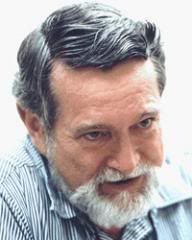
“There is a culture war in America, but it is not between liberals and conservatives, who in fact share a great many core values – including a commitment to children, family, community, personal responsibility and democracy. It is between the lower and higher orders of our human nature. It is between an imperial politics of individual greed and power and a democratic politics based on principle and the common good. It is between Power Seekers at the extreme political fringes who remain imprisoned in an Imperial Consciousness and the realists of the political mainstream who truly want to solve the problems that beset us all.”David Korten wrote those provocative words in his book, The Great Turning: From Empire to Earth Community published last year by Berrett-Kohler.
Korten worked for more than thirty-five years in preeminent business, academic, and international development institutions. He eventually turned away from the establishment and instead worked with public interest citizen action groups. He is the co-founder and board chair of the Positive Futures Network and Yes! A Journal of Positive Futures, an associate of the International Forum on Globalization and a member of the Club of Rome. He serves on the boards of the Business Alliance for Local Living Economics and the Bainbridge Graduate Institute.
In his early career, Korten set up business schools in low-income countries starting with Ethiopia, hoping to help establish a new class of professional business entrepreneurs would be the key to ending global poverty. He also completed his military service stateside during the Vietnam War as a captain in the U.S. Air Force, with duty at the Special Air Warfare School, Air Force headquarters command, the Office of the Secretary of Defense and the Advanced Research Projects Agency.
Following his service in the military, Korten was a faculty member of the Harvard University Graduate School of Business where he taught in Harvard’s middle management, M.B.A. and doctoral programs. Korten also served as Harvard’s adviser to the Central American Management Institute in Nicaragua and later joined the staff of the Harvard Institute for International Development, where he headed a Ford Foundation funded project to strengthen the organization and management of national family planning programs.
When Korten left academia in 1970 he moved to Southeast Asia where he lived for almost fifteen years, serving as a Ford Foundation project specialist and later as Asia regional advisor on development management in the U.S. Agency for International Development (USAID). His work there earned Korten international recognition for helping to engineer the development of intervention strategies for transforming public bureaucracies into responsive support systems dedicated to strengthening community control and management of land, water and forestry resources.
Korten ultimately broke with the international aid system when he became convinced they were actually increasing poverty and environmental destruction and impervious to change. During the last five years of Korten’s work in Asia he coordinated with leaders of Asian nongovernmental organizations on identifying the root causes of development failure in the region and building the capacity of civil society organizations to better facilitate positive global level change.
Korten’s life experience abroad convinced him that the United States was actively promoting both at home and abroad – the very policies responsible for, inequality, environmental devastation and social disintegration. At that point a friend advised Korten he would best serve the cause of ending global poverty by returning to the United States and educating his fellow Americans about the destructive role of corporate imperialism. Hence, Korten returned to the United States in 1992 to share with his fellow Americans the lessons he had learned abroad.
Ironically, Korten’s original motivation for international travel as a college senior in 1959 was to persuade the world’s poor to reject revolution in favor of America’s political and economic system. Instead, as he writes, Korten found himself learning far more from the people he hoped to teach:
“The subsequent experience of working for some thirty years as a member of the international development establishment profoundly changed my worldview. I had gone abroad to teach. Far more consequential than what I taught was what I learned – about myself, my country, and the human tragedy of unrealized possibility. Ultimately, I realized I must return to the land of my birth to share with my people the lessons of my encounter with the world.”In 1995 Korten published an international bestseller, When Corporations Rule the World and followed that up with The Post Corporate World: Life After Capitalism several years later. Korten agreed to a podcast interview with me about his current book, life experience and worldview. Please refer to the media player below. The interview is approximately fifty-six minutes.
This interview can also be accessed at no cost via the Itunes store by searching for Intrepid Liberal Journal.
2 comments:
Thanks for this podcast. Korten is extremely articulate in advocating for so much of what we need in the world right now, and you did a good job of posing some good "devil's advocate" questions to draw out some of his reasons for going against the conventional wisdom.
Wow, spectacular interview. I like how you let the interviewees speak and allow the discussion to flow naturally.
I was pleasantly surprised to hear Mr. Korten talk about how money and debt is manipulated to keep the poor poor. Everyone needs to hear this interview.
Post a Comment